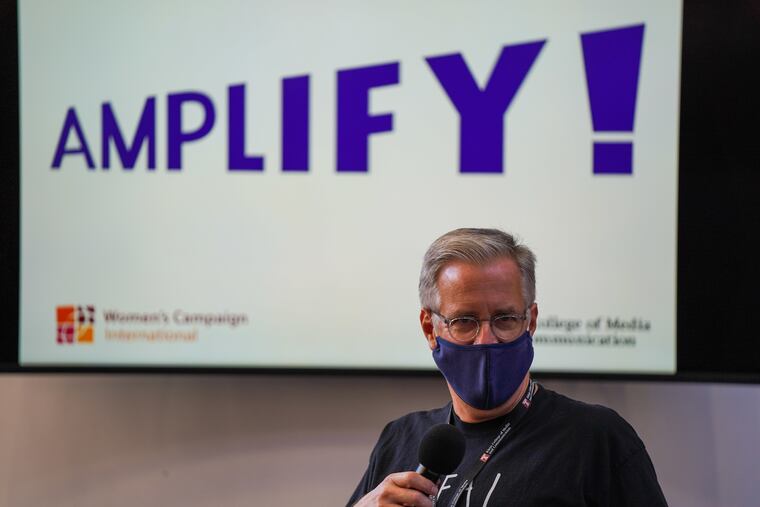Helping overcome vaccine hesitancy was their goal. The surprise? Who was the problem.
The path to getting more high school students vaccinated against COVID-19 might go through parents.

A group of college students gathered Saturday at Temple University to brainstorm new ways to overcome COVID-19 hesitancy among high school students.
Then they were thrown a curveball.
Students from Swenson Arts & Technology High School presented — via Zoom — results of a poll of students at the Northeast Philadelphia public school showing that parental skepticism about the vaccine was a major barrier to vaccination.
That information left Wes Marshall and Ted Fein, two of the 20 or so college students at the event in Annenberg Hall, leaning toward a message targeted at parents, who are typically more susceptible to serious bouts with the coronavirus than teenagers are.
During a small group session, Marshall and Fein imagined a poster with an image of a firefighter, police officer, or doctor standing with a parent. The message to parents would be: “You let them protect you,” Marshall said, referring to firefighters. “Let your kids protect you, too.”
Philadelphia vaccination rate for ages 12-17 is 38%, according to city data. The rate ranges from 28% for Blacks to 79% for Asians. The overall fully vaccinated rate in the city is 66.5%.
Sponsors of Saturday’s event, called an idea-generating rally, were Temple’s Klein College of Media and Communication and Women’s Campaign International, a Philadelphia nonprofit chaired by former Pennsylvania Congresswoman Marjorie Margolies that works around the world to empower women and girls.
“We’re trying to bring what we’ve done around the world here,” she said.
Margolies said the group brainstorm at Temple was related to the nonprofit’s Covid-Free Ambassadors and Representatives Program, which bring youth together to help them learn how to address social issues and communicate effectively in the digital media age.
The work by Women’s Campaign International is part of a broad effort at Temple, supported by a $5.5 million grant from the Health Resources and Services Administration, an arm of the U.S. Department of Health and Human Services, to improve health outcomes among vulnerable populations across Pennsylvania. Women’s Campaign was one of more than 30 nonprofits statewide to receive a slice of $3.5 million from the federal grant that was committed to community groups.
“The goal is to come up with something new and interesting and bold” that could convince more teenagers to be vaccinated, said Joe Glennon, chair of the Klein Department of Advertising and Public Relations, but even if that doesn’t happen the students benefit from the practice generating ideas.
“This experience will give them tools and that muscle memory, so the next time they run across a creative challenge, whether it is for social good or to sell Chevys, it doesn’t matter. It’s the same thing, but the more times you use those muscles, the stronger they get,” he said.
Cierra Copeland, a senior advertising major from West Philadelphia, said she was there to get some exposure to public relations and problem-solving. “I just want to make sure my community is being safe and smart about it,” she said.
Copeland worked with a group that devised a QR code scavenger hunt across multiple high schools. The QR codes would take the students to a website with information debunking myths about the COVID-19 vaccine, such as the notion that it causes infertility.
The goal would be for the students to educate their parents, paving the way for the younger generation to be vaccinated.
“I thought it was so interesting that it wasn’t access. It was the parents,” said Niani Aleem, a senior communications studies major.
Down the hall, another group decided a poster would not be effective. “You pass by posters all the time in high school,” said Isabel Chowdhury, a junior public relations major.
Chowdhury and her partners tossed around ideas on reaching students with educational material at a football game, maybe harnessing the pull of a popular quarterback.
“People are going to go to the game even if they are anti-vaxxers,” said Natalie Devlin, also a junior public relations major.